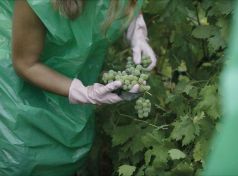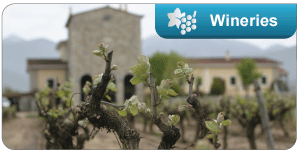Modern winegrowing on a human scale
Today’s Greek winegrowing continues its century-old tradition in the art of vinification. At the same time, it employs modern winegrowing, winemaking and technological methods. It thus taps in the best possible way both the uniqueness of Greek native cultivars and of the experience and the know-how of those who toil over the creation of the new wines of Greece: winegrowers, vintners, agriculturalists, oenologists and those involved in the winegrowing process. Both the people as well as their techniques which, to a great extent, reflect the particularities of the country, compose an industry of modern winegrowing on a human scale whose key, process-shaping features are as follows:
• The age-old winegrowing and winemaking tradition, accompanied by the experience and the historical heritage of centuries. It is a tradition deeply rooted in modern winegrowers who now cultivate the same vineyards sung by Homer and Aristotle. Taking all facets (social, economic, cultural, artistic, philosophical and religious) into consideration, the history of vine and wine are the very history of the anthropocentric nature of Greek civilization.
• The distinct topography of Greece’s vineyards, characterized by the great number of small winegrowing zones often called “isles” in both mainland and island Greece, where unique winegrowing techniques have been developed over time, such as planting on mountain stone terraces and the art of pruning, with the basket-shaped wreath (kouloura) of Santorini being the most classic example.
• The particular geomorphology of the country, which generally does not favor intensive winegrowing techniques. For instance, mechanical cultivation, which is virtually non-existent in Greece’s vineyards, cannot be applied in inaccessible or mountain terroirs. Thus, despite the availability of new technologies, most winegrowing tasks are done manually, with handpicking the grapes being the most characteristic example. It is thus easy to understand and realize why there is such a small volume of grape production and why the yields per hectare are low.
• The great number of grape varieties native to Greece which keep the country’s winegrowing production from falling into the monotony of a mere three to four varieties and offer seasoned wine lovers a glorious terrain for exploring the diversity and singularity of Greek wines.
• The relatively small size of land plots, which do not allow for the creation of large, privately-owned winegrowing areas, and the presence of
numerous small winegrowing ventures, many of which are family-owned.
• The collaboration of the limited number of large, private as well as cooperative wineries with hundreds of small, independent wine growers who cultivate small individual vineyards capable of producing premium quality grapes in line with vintners’ specifications.
• The distinct and unique winegrowing practices that go back thousands of years, such as production of retsina and other traditional wines such as straw wines (vins liastos), etc.
All these features make for a modern winegrowing on a human scale.



